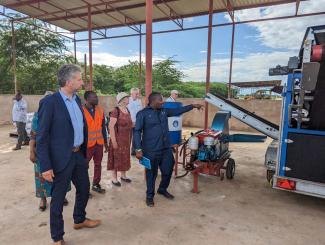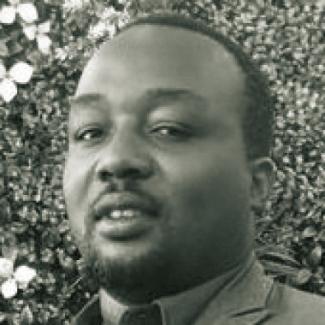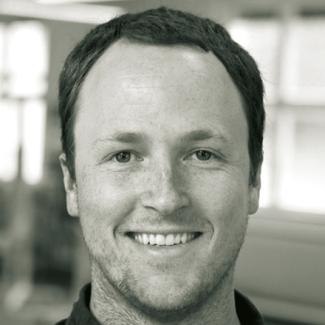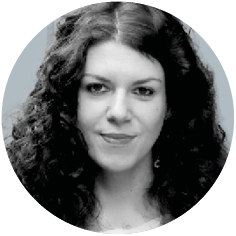Composting
High-impact partnership for waste management

When did your joint project start?
Stephan Klingebiel: The project was officially launched in 2018 and completed in 2020, but we continue to support the facility. We teamed up under the SKEW Municipal Climate Partnerships initiative, initially with the idea of building a biogas plant – because it was clear from an early stage that a project for waste management and recycling was needed. Like many communities, Moshi has a waste problem, partly because waste from households is mixed. But the biogas project proved too complex. After reciprocal visits in 2017, we made a joint decision to build a composting plant instead. The project was financed with support from the SKEW Fund for Small-Scale Projects. We have been twin towns since 2014.
How exactly does the composting plant work?
Klingebiel: At first, we paid a person to supervise the separation of organic waste from the rest of the garbage collected at two Moshi markets. Today, that’s no longer necessary – the vendors know how to separate the waste. Organic waste is deposited on a concrete surface and mixed with shrubs to add structure. Three machines were jointly purchased for the project. The first is a shredder, to shred and mix the organic waste and green material. The material is then naturally hygienised and kept at temperatures of 45 to 60 degrees Celsius. This ensures that microbiological activities promote the decomposition of organic matter. The most important tasks in this phase are turning the material with another machine, a mechanical turner, and constant watering. After 12 weeks, the maturation of the compost is complete, and it enters the third machine – the sifting machine – where it is sieved.
David Kimaro: The plant is located about 18 kilometres from the city centre and produces around 12 to 15 tonnes of compost in a month. During the composting process, the compost is repeatedly turned, watered and, above all, its temperature is checked. The process can take up to twelve weeks. Nothing but organic waste goes into it; we do not work with chemicals. Organic residues from sieving are recycled for the next process. Finally, the finished compost is packaged and sold mainly to small farmers in the region. We receive enquiries from international farms, but we cannot always handle their large orders. Demand is very high.
How does your waste partnership work? Who plays what role in the project?
Viane Kombe: We have been working with SKEW since 2010. We were involved in the pilot phase of the “50 Municipal Climate Partnerships by 2015” project. From the outset, the German partners’ role has been about capacity building and knowledge exchange on emissions reduction, as well as ensuring technical and financial support.
Klingebiel: My direct contact in Moshi, who is responsible for the municipality’s international relations, takes care of the coordination of joint ideas and projects. As far as the composting plant is concerned, we from Tübingen of course continue to support where necessary, but Moshi now runs the plant alone and is also responsible for the maintenance costs, which can meanwhile be covered from the sale of compost. The plant was also constructed by the municipality of Moshi. We only had a German engineer on site once, at the very beginning, to run a training programme. Composting is not widely practised in Tanzania; there is only one other plant in Dar es Salaam.
What are the main achievements of the project?
Kombe: The important thing for us is that it enables us as a municipality to help mitigate climate change. The project has received a great deal of national and international attention. We already had visits from three ministers. We believe that Moshi can be a role model and hope that others will follow our lead.
Klingebiel: We are also very pleased about the general – and media – attention that the plant has attracted. What is more, it has strengthened our bond as twin towns. It was the first project to be launched on this scale and has worked very well. We are also proud of the fact that, three years on from the official end of the project, the plant is still operating smoothly, without hitches or downtime, and it is a major asset for Moshi.
What were the biggest obstacles faced?
Kombe: Initially, people working in the market were unaware of the value of waste. So, not everyone saw the point of the project straight away. But that soon changed after the project started up, and a number of meetings had been held. Now, there is a very high level of acceptance for the facility. However, there are always a few people collecting waste and selling it as animal feed or fertiliser.
Klingebiel: We did not want to take away work from informal garbage collectors, of course. At the outset, we didn’t realise that they collected such a large amount of organic waste, so we planned for a greater volume of waste than was available. We now hope to be able to compost more waste from other markets in the future, in order to fully utilise the capacity of the plant, but at the same time to ensure that the informal waste pickers can continue their work and that they do not lose their livelihood because of us.
What were the most important insights and lessons learned?
Klingebiel: Good preparation and cooperation are very important. Projects like this work only if they are really needed. The initially planned biogas project did not materialise because the partners in Moshi did not really see the point. Of course, most poor communities don’t say no when rich cities approach them with project proposals, but if you listen very carefully on the ground, you find out what is really needed.
Kombe: Through SKEW we learned to implement and carry forward projects confidently and independently – as long as they fit into the organisational structures of our municipality.
What has the project done for sustainability and environmental protection in Moshi?
Kimaro: We have already produced 210 tonnes of compost. We have thus prevented organic waste from damaging soil and groundwater and from producing methane – a gas much more harmful to the environment than carbon dioxide. The compost also benefits local farmers.
Klingebiel: Garbage is dumped in Moshi at a landfill. The landfill is very expensive – it is financed by the World Bank, but the money needs to be repaid. The dump is full after about five years, which means that a new expensive dump would have to be built every five years. The alternative is that waste gets dumped in the landscape. Our composting plant removes and recycles a considerable amount of that waste, so the landfills no longer fill up so quickly.
What advice would you give to other municipalities wishing to implement similar projects?
Klingebiel: We felt it was important to gather information on the ground, so we started by applying to SKEW for a small € 10,000 project to finance reciprocal trips for experts and municipal representatives. This preparatory phase is very important. Also, every aspect and step need to be closely scrutinised. We came to realise, for example, that we need to hold ongoing workshops at the markets to include new vendors.
Kombe: It is important to create awareness for the project within the community or target group. What is more, it is vital that you choose the right location, especially if you are making compost; otherwise, if a particular market sells only a small range of crops, you may have seasonal gaps in income. Building the plant next to the landfill site also has lots of advantages. For example, it has enabled us to use the landfill’s scales and front loaders.
What are your plans for the future?
Kombe: As far as the composting plant is concerned, we would like to access more waste resources to make full use of the plant’s capacity. We are already talking to a neighbouring municipality to get more waste from them.
Klingebiel: A delegation from Moshi, including David Kimaro and the mayor of the city, will visit us in Tübingen in May. We will then discuss existing projects as well as new ones. There are plans, for example, for us to cooperate on solar energy.
Stephan Klingebiel is the town twinning officer of the city of Tübingen.
stephan.klingebiel@tuebingen.de
Viane Kombe is Head of Moshi Municipality’s waste management department.
vianejohn64@gmail.com
David Kimaro is a Moshi Municipality employee in the waste management department and is responsible for the composting project.
ckimaroki@gmail.com











